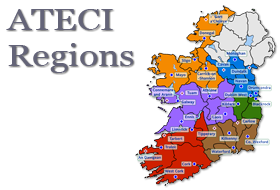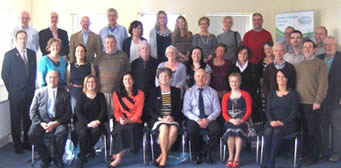Exploring Teacher-Artist Partnership as a Model of CPD for supporting and enhancing Arts Education in Ireland
The Research report on 'Exploring Teacher-Artist Partnership as a Model of CPD for Supporting & Enhancing Arts Education in Ireland' was launched on
8/03/2023 in The Clock Tower, DES, Marlborough St., by the Minister of Education and Skills, Deputy Richard Bruton, TD.
The report may be downloaded by clicking on Exploring Teacher-Artist Partnership.
ATECI Meetings 2017/2018
List of ATECI meetings for the year 2016/2017
Wednesday 20th September 2017 in Glasnevin Cemetery Conference Centre
Wednesday 22nd November 2017 in Kilkenny Education Centre
Wednesday 17th January 2018 in Blackrock Education Centre
Friday 9th March 2018th - To be decided
Saturday 10th March 2018 - AGM - To be decided
Wednesday 17th May in Mayo Education Centre
NEW - Access to all CPD courses nationwide
Please note that one can access details of all CPD courses offered by all Education Centres and all Support Services which include:
Association of Teahcers'/Education Centres in Ireland (ATECI), Junior Cycle for Teachers (JCT), Professional Development Service for Teachers (PDST), The National Behaviour Support Service (NBSS), Special Education Support Service (SESS), National Induction Programme for Teachers (NIPT) and Project Maths by clicking on the tab 'CPD CALENDAR' on the menu bar.
OECD PISA Assessment of Digital Skills
New approach needed to deliver on technology’s potential in schools
Report - 15/09/2022
Schools have yet to take advantage of the potential of technology in the classroom to tackle the digital divide and give every student the skills they need in today’s connected world, according to the first OECD PISA assessment of digital skills.
“Students, Computers and Learning: Making The Connection” says that even countries which have invested heavily in information and communication technologies (ICT) for education have seen no noticeable improvement in their performances in PISA results for reading, mathematics or science.
Ensuring that every child reaches a baseline level of proficiency in reading and mathematics will do more to create equal opportunities in a digital world than solely expanding or subsidising access to high-tech devices and services, says the OECD.
In 2012, 96% of 15-year-old students in OECD countries reported having a computer at home, but only 72% reported using one at school. Overall, students who use computers moderately at school tend to have somewhat better learning outcomes than students who use computers rarely. But students who use computers very frequently at school do much worse, even after accounting for social background and student demographics.
“School systems need to find more effective ways to integrate | technology into teaching and learning to provide educators with learning environments that support 21st century pedagogies and provide children with the 21st century skills they need to succeed in tomorrow’s world,” said Andreas Schleicher, OECD Director for Education and Skills. “Technology is the only way to dramatically expand access to knowledge. To deliver on the promises technology holds, countries need to invest more effectively and ensure that teachers are at the forefront of designing and implementing this change.”
The report found that the gap between advantaged and disadvantaged students in digital reading was very similar to the differences in performance in the traditional PISA reading test, despite the vast majority of students using computers whatever their background. This suggests that to reduce inequalities in digital skills, countries need to improve equity in education first.
To assess their digital skills, the test required students in 31 countries and economies* to use a keyboard and mouse to navigate texts by using tools like hyperlinks, browser button or scrolling, in order to access information, as well as make a chart from data or use on-screen calculators.
Top performers were Singapore, Korea, Hong Kong-China, Japan, Canada and Shanghai-China. This reflects closely their performances in the 2012 print-reading test, suggesting that many of the skills essential for online navigation can also be taught and learned using standard, analogue reading techniques.
But the report reveals striking differences. Students in Korea and Singapore perform significantly better online than students in other countries with similar performance in print reading, as do students in Australia, Canada, Hong Kong-China, Japan and the United States. In contrast, students in Poland and Shanghai-China – both strong performers in print reading – do less well transferring their print-reading skills to an online environment.
* Participating countries and economies: Australia, Austria, Belgium, Brazil, Canada, Chile, Chinese-Taipei, Colombia, Denmark, Estonia, France, Hong Kong-China, Hungary, Ireland, Israel, Italy, Japan, Korea, Macao-China, Norway, Poland, Portugal, the Russian Federation, Shanghai-China, Singapore, the Slovak Republic, Slovenia, Spain, Sweden, United Arab Emirates and the United States.
More information on the assessment and findings of this report is also available at: http://www.oecd.org/education/students-computers-and-learning-9789264239555-en.htm.
For further information, journalists should contact the OECD Media division (tel. + 33 1 45 24 97 00).
Mental Health Awareness Initiative (MHAI)
The Association of Teacher Education Centres in Ireland (ATECI), working in collaboration with Headstrong and the SPHE, has secured funding for the development of an initiative which aims to involve post–primary teachers nationwide in an ‘awareness raising programme’ on the issue of teenage mental health. It is envisaged that this initiative will support schools in their development of a whole-school approach in the promotion of positive mental health for all as outlined in the recent DES publication Well – Being in Post Primary Schools.
Teaching Council - Fitness to teach
The Teaching Council is responsible for promoting high professional standards in teaching, for the benefit of pupils and students, and the profession.
The Teaching Council publishes a Code of Professional Conduct for Teachers
This Code acts as a guide for teachers.
The Teaching Council will soon commence investigating complaints about registered teachers. Click on complaints about registered teachers for more information.
For further information please click on the link below.
PDST - Professional Development Service for Teachers
Since the first support services for teachers were established in the 1990’s, the system of professional development support has grown incrementally to include support services established to address a variety of needs such as school leadership and development planning, curriculum change, education programmes and other areas of teaching and learning. In recent years there has been consolidation and re-structuring of the support service system. The Professional Development Service for Teachers or PDST is the name given to the newly created CPD service for teachers, combining teachers from primary and secondary schools in a single integrated support team working regionally under a national Director.
Support will be provided to schools by PDST personnel working in multi-disciplinary teams working in close co-operation with the Education Centre network to respond to needs identified by schools.
New Course for Maths Teachers
The new Professional Diploma in Mathematics for Teaching (part-time) aims to train out-of-field mathematics teachers over the next three years.
NUI Galway and UL AllianceThe Professional Diploma in Mathematics for Teaching was officially launched on Friday May 25 by the Minister of State for Research and Innovation Seán Sherlock. The programme, which is part-time, aims to train out-of-field mathematics teachers over the next 3 years.
In 2010, the National Centre for Excellence in Mathematics and Science Teaching and Learning (NCE-MSTL), based at the University of Limerick, drew attention to the systemic issue of out-of-field teachers of mathematics in a report which found that 48% of teachers teaching mathematics at post-primary level had no qualification in mathematics teaching.
Speaking of the new Professional Diploma, Professor John O’Donoghue, Director National Centre for Excellence in Mathematics and Science Teaching and Learning (NCE-MSTL), said:
“This decision represents an historic step in moves to reform post-primary mathematics. Ireland’s urgent need to raise science and mathematics knowledge and skills in order to serve critical national educational, economic and entrepreneurial needs is well documented.
"This programme will support teachers to focus on subject knowledge and practice that will impact student performance and stimulate interest in mathematics and science”.
Jointly accredited and designed by NUI Galway and UL, the programme will be delivered nationwide free of charge through a national consortium of higher education institutions and the Association of Teacher Education Centres in Ireland. Approximately 400 teachers will begin the course this autumn.
The course will be a blended learning programme based on a part-time (2-year) university accredited professional diploma, delivered locally and through online modules. Google will support the flexible online delivery of the programme as the chief technology partner in the NUI Galway-UL Alliance-led consortium.
The new programme is aligned with the national curriculum reform, Project Maths (2008-2015); the requirements of the Teaching Council as the statutory body for teaching in Ireland; and latest developments in innovative educational technology and mathematics education research. There will be specific provision for teachers in Irish-medium schools through a Dioplóma Gairmiúil sa Mhatamaitic don Mhúinteoireacht, supported by NUI Galway and Acadamh na hOllscolaíochta Gaeilge, Gaillimh.
Under the NUI Galway-UL Strategic Alliance, a team from the School of Mathematics, Statistics and Applied Mathematics and School of Education, NUI Galway has worked closely with the National Centre for Excellence in Mathematics and Science Teaching and Learning (NCE-MSTL, UL) to develop the new professional mathematics education programme.
Dr Tony Hall NUIGSpeaking of the announcement, Dr Tony Hall, NUI Galway, said:
"The principal focus of this unique new course is to enhance teachers’ mathematical content knowledge and their understanding of the subject of mathematics, helping to support the wider national reforms currently taking place in mathematics education in Ireland.”
The NCE-MSTL leads a national consortium of Higher Education Institutions (HEIs) established for the purposes of delivering this programme. The consortium includes: NUI Galway, University College Dublin (UCD), St Patricks’ College, Thurles; Institute of Technology, Sligo; Institute of Technology, Tallaght; Institute of Technology, Carlow; Cork Institute of Technology; Dundalk Institute of Technology; Letterkenny Institute of Technology; Waterford Institute of Technology.
The consortium also includes, through the NCE-MSTL, its founding partners in the Shannon Consortium: UL (lead), IT Tralee, Limerick Institute of Technology and Mary Immaculate College.
Minister for Education Ruairi QuinnCommenting on the launch, Minister for Education and Skills Ruairí Quinn said:
“The provision of this course provides further evidence of my personal commitment, and that of my Government colleagues, to supporting maths teaching in post primary schools.
"We are providing over €2million to fund this course, and are making it available at locations across the country and free of charge, to maximise accessibility and participation.”
Minister Sherlock said:
“The teaching community has shown significant interest in this course since my announcement last September. I am pleased that the course will facilitate teachers who are working during the day, with convenient local and online access.”
Partnering with Google Ireland brings distinctive benefits to the programme, enabling the providers to maximize the blended learning opportunities for students and providing possibilities for use of portable and mobile computing to enhance mathematics teaching in Irish schools.
John Herlihy, VP and Head of Google in Ireland said:
“Government, industry and academia all agree on the need for more students to study Maths, Science and Engineering subjects at third level and on the need to produce graduates with strong analytical and problem solving skills.
"The introduction of a Professional Diploma in Mathematics for Teaching is an important step in augmenting how we teach maths in our secondary schools.
"I believe that providing ‘out of field’ teachers with the specialised skills to teach maths in an enthusiastic and knowledgeable way will be a catalyst for more students pursuing maths based subjects at third level.”
The programme will be offered free to eligible teachers starting in September 2012. Places will be allocated on a quota basis by the Department of Education & Skills.
The programme is closely aligned with the needs of out-of-field teachers of mathematics, Project Maths and the requirements of the Teaching Council.
To apply online please click here.
For further details call the National Centre for Excellence in Mathematics and Science Teaching and Learning (NCE-MSTL) on 061 234786 or email [email protected].
PDST Service
Since the first support services for teachers were established in the 1990’s, the system of professional development support has grown incrementally to include support services established to address a variety of needs such as school leadership and development planning, curriculum change, education programmes and other areas of teaching and learning. In recent years there has been some consolidation and re-structuring of the support service system. A huge volume of work has been done by our services and all can be accessed through the links in the right sidebar (Existing websites).
See here for more info


